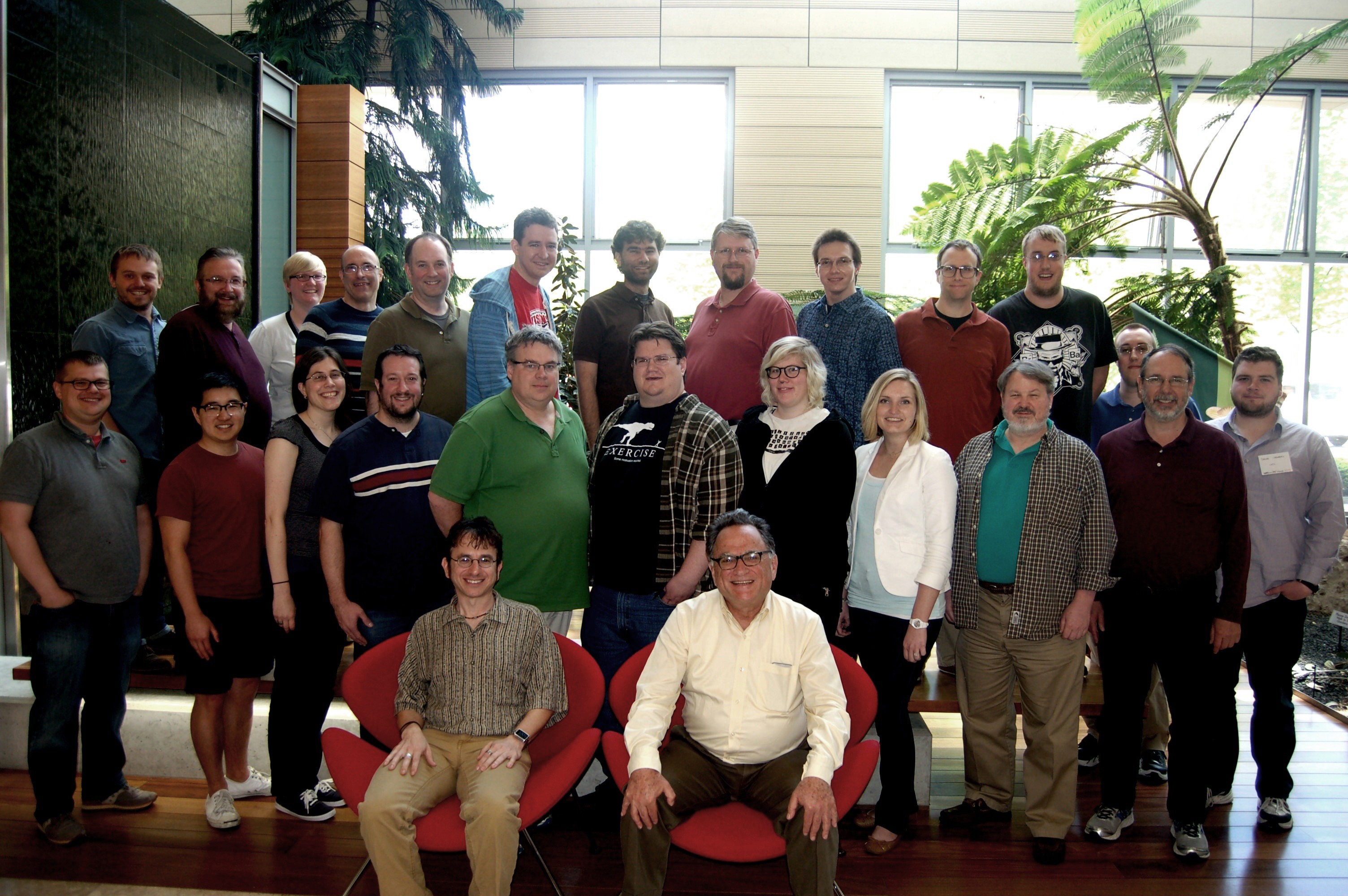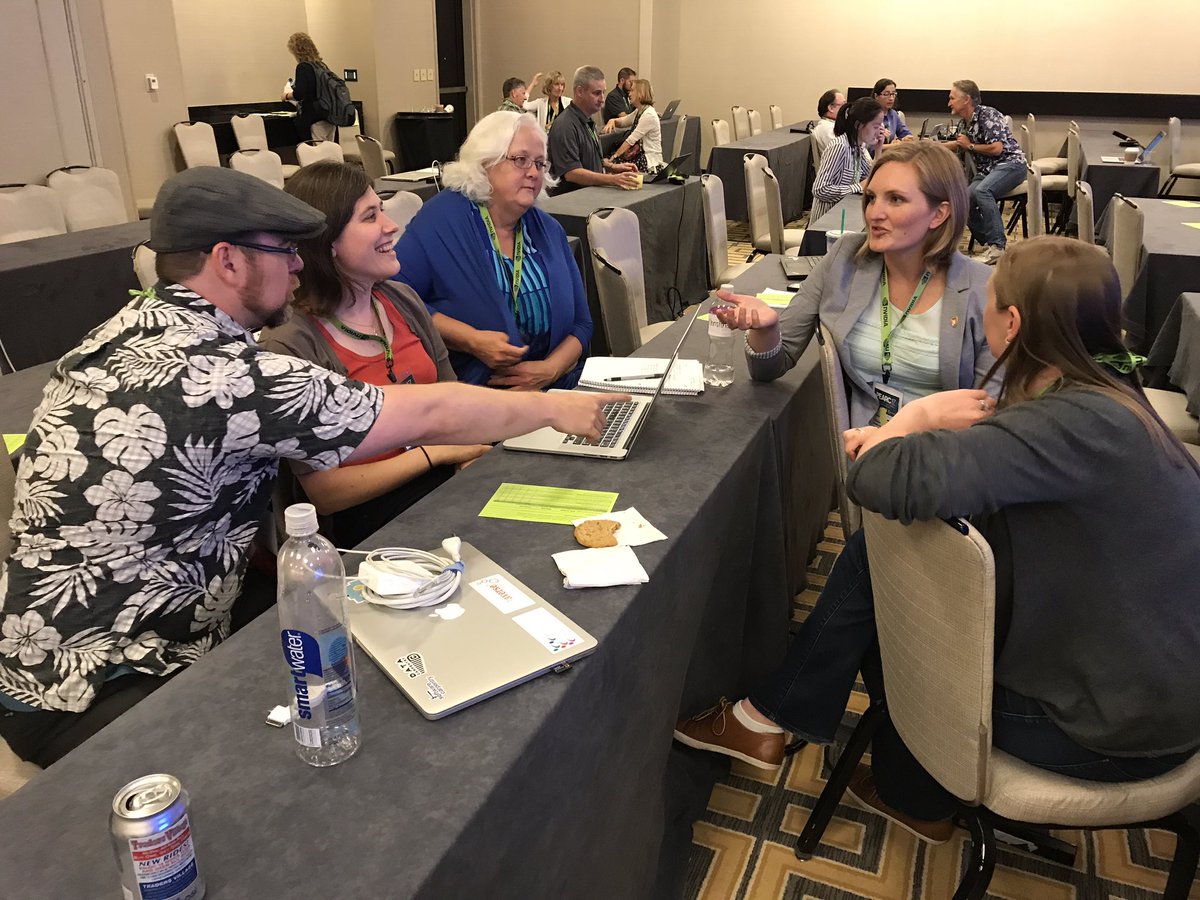 Interfacing with ACI Resource Providers
Interfacing with ACI Resource Providers
Building working relationships with other ACI staff. Liaising in the exchange of expertise between ACI resource staff, including intra- and inter-institutional connections. Translating user feedback to inform the enhancement and optimization of ACI Resources.
- Introduction
- Collaborating with ACI Staff in Your Working Group
2.1 Coordinate with Other Facilitators
2.2 Establish Working Relationships with Other Personnel
2.3 Communicate via Consistent Practices - Building Connections beyond Your Direct Working Group
3.1 Networking with Other ACI Staff at Your Institution
3.2 Leveraging Contacts Outside Your Home Institution - Toward Improving ACI Resources and Services
Introduction
Given the range of facilitation activities discussed in prior chapters and the range of technical knowledge required to facilitate varying researcher needs across applicable ACI, it should be natural but also essential for Facilitators to build an interpersonal network of coworkers and other professionals with expertise in applicable areas. Certainly, no single individual will possess the entirety of skills and experience necessary to identify appropriate technical and non-technical solutions such as learning materials and human connections that will enable researchers. Rather, Facilitators might think of themselves more as a gateway to information for researchers, whether by way of possessing that knowledge themselves, or by knowing how and where to find additional information resources, which should include the expertise of other ACI staff, both within and external to the Facilitator’s immediate working group. More specifically, Facilitators will frequently collaborate with other personnel when pursuing a variety of facilitation and related activities, including:
- implementing an ACI Plan
- troubleshooting user issues
- sharing technical and non-technical knowledge or experiences
- coordinating with partners for education/training efforts
- contributing to discussions on enhancements to ACI services and resources
- and many more, as appropriate
Furthermore, and as an indirect benefit of having a rich interpersonal network for performing their own responsibilities, Facilitators may enhance the capabilities of ACI-providing organizations and personnel by enhancing professional connections between them. The following sections of this chapter discuss various strategies for establishing working relationships with other ACI staff and for growing a professional network that accelerates positive outcomes for researchers and for ACI-providing organizations.
Jump to: top
Collaborating with ACI Staff in Your Working Group
First and foremost, Facilitators will collaborate regularly and significantly with members of their immediate working group, especially in supporting the day-to-day activities of working with researchers. The immediate working group of a Facilitator of research computing services will typically include other Facilitators, systems specialists, and direct supervisors. Practices for collaboration, including coordinating with other facilitators, developing relationships with other ACI specialists, and establishing consistent communication practices, are addressed in the following sections.
Jump to: top
Coordinate with Other Facilitators
As introduced in previous chapters, it is of utmost importance that multiple Facilitators in the same working group coordinate their activities in working directly with researchers. Facilitators will need to coordinate record-keeping practices for engagement and assistance activities so that other Facilitators can effectively assist the same researchers in the future. Even when only one individual acts as the primary Facilitator, consistent documentation of activities will help other staff and Facilitator successors in the event that the Facilitator is out of the office or leaves for a new position. Similarly, Facilitators should communicate clearly and establish consistent practices for determining ownership of support emails (perhaps via a ticketing system). Facilitators will also likely collaborate heavily in developing an overall researcher outreach and education/training program, including the development of specific pieces of documentation and other learning materials. For more details on inter-Facilitator collaboration for these various activities, see the chapters on Outreach, Engagement with Researchers, Assisting Researchers in the Use of ACI Resources, and Education and Training of Researchers.
Jump to: top
Establish Working Relationships with Other Personnel
Within the Facilitator’s immediate ACI team, the Facilitator will frequently depend on input, expertise, and effort other staff. Depending on the services and staffing model, Facilitators should work to cultivate positive working relationships with all staff within their unit, but especially with those whose efforts most directly inform facilitation practices and impact researchers. For example, a Facilitator of research computing resources will likely collaborate with systems administrators of compute and data storage systems, and perhaps with programmers on staff who contribute to operations or collaborate on research projects. Developing productive relationships with these individuals will be especially important for a number of facilitation activities, including:
- describing systems capabilities and how to take advantage of them when working with researchers
- implementing any technical measures when supporting a researcher’s ACI Plan with necessary systems adjustments
- troubleshooting when assisting a researcher with an issue
- guiding overall improvements to ACI resources managed by the group
Additional activities not covered here may also depend on interactions with coworkers, especially for ACI services outside of the specific context of research computing resources.
Jump to: top
Communicate via Consistent Practices
Interactions between members of the working group will be significantly enhanced if the Facilitator has consistent avenues for initiating interactions with other staff, including regular meetings, email and/or ticket systems, real-time messaging (e.g Slack or other chat applications), and respectful practices for dropping into one-another’s offices. Frequently, the Facilitator’s role in coordinating system changes in response to researcher needs will entail practices of project management and team coordination, with or without significant input from supervisors. Practices for involving supervisors should also be established for the team and for the Facilitator-supervisor relationship, just as for working relationships with other staff. If the Facilitator spends any amount of time supervising other personnel (even for activities outside of “facilitation”) the Facilitator should seek to coordinate activities across roles and activities, always for the greatest outcome for researchers.
Jump to: top
Building Connections beyond Your Direct Working Group
Because a Facilitator should act as an “honest broker” for researchers by pointing them to the most appropriate ACI resources beyond the Facilitator’s home organization, Facilitators will benefit from forming relationships with individuals at other organizations outside of their immediate working groups. For example, the Facilitator may point a researcher to resources within other organizations on campus (or off-campus) that provide complementary technology, including vendor representatives and providers of national ACI resources. Specific considerations for building professional connections across types of other ACI-related organizations are discussed below.
Jump to: top
Networking with Other ACI Staff at Your Institution
Personnel within other organizations in the Facilitator’s home institution will be crucial to Facilitators ability to advise researchers in a range of ACI-related needs and services. For example, a Facilitator at a campus research computing center will likely find it helpful to connect with campus librarians, central IT and college/department IT groups, and perhaps with related technology providers such as a biotechnology/gene sequencing facility. Doing so will allow the Facilitator to recommend these organizations and point researchers to the appropriate representative when questions and needs arise that are beyond the scope of the Facilitator’s home organization.
Processes for identifying these organizations and individuals will vary across campus cultures and may become more apparent to a Facilitator over time. Beyond web-based searching and word of mouth, the Facilitator can attend events, talks, or trainings given by these organizations in order to establish an initial connection with appropriate representatives who work there. These individuals might attend events and presentations given by the Facilitator’s organization, which present additional opportunities for initiating contacts. After making an initial connection, the Facilitator may wish to meet with the individuals, to establish a working relationship and to determine the best pathways for pointing researchers to each other’s resources. Most successfully, ACI-REF Facilitators at larger institutions have even established regular meetings with representatives across ACI-related organizations, so that the various participants can coordinate their services and introduce researchers to one another. Practices for establishing these local groups on a campus are similar to those discussed in Facilitating Research Connections, and later in this chapter under “Liaising Connections between Other Personnel”. Overall, the Facilitator and individuals they connect with across their institution will likely have more collaborative relationships if they focus on what is best for researchers and their projects.
Jump to: top
Leveraging Contacts Outside Your Home Institution
Drawing on the content in Enhancing ACI Knowledge, there are a number of researcher-facing resources that the Facilitator should be familiar with and for which a personal connection will benefit researchers with whom the Facilitator works with. For example, nationally-funded computing resources such as XSEDE, the Open Science Grid (OSG), the National Center for Genome Analysis Support (NCGAS), and other widely available providers of computing resources and consulting services, are likely to be important options for some researcher needs. Facilitators should take advantage of opportunities to connect with representatives from these organizations in order to liaise a researcher’s introduction to their services. Less directly, Facilitators and their entire home organization will benefit from connecting with staff in analogous roles and organizations at other institutions, in part, to compare and contrast service offerings, technology implementations, and support practices. Conferences, professional development events, and cross-institutional communities are most likely to provide opportunities for relevant conversations; for example, many ACI-REF Facilitators participate in the following events: XSEDE and OSG conferences, Advanced Research Computing on Campuses (ARCC) meetings, Campus Research Computing (CaRC) Infrastructures Consortium, and many others listed here.
Beyond researcher-facing services, there are several reasons why a Facilitator may develop relationships with outside vendors of hardware, software, and other technologies. As the major point of contact for researchers using the ACI services of the Facilitator’s organization, the Facilitator may end up coordinating the researcher purchases of hardware as part of a ‘condo’ model of data storage or computing capacity. For large additions of hardware within the Facilitator’s ACI organization, the Facilitator may arrange meetings with vendors to find the most appropriate additions to meet researcher needs. Facilitators may also coordinate software license purchases that are shared across research groups or made with central campus funds, may work with vendors to explore new middleware options to enhance the user interface to local resources, or may coordinate and contribute to trainings in using vendor-provided software for local researchers. In all of these cases, the best outcomes for researchers and their projects will be achieved if the Facilitator can contribute positively to the relationship with vendors in terms of specifying needs and representing use cases, as well as negotiating prices. These relationships and interactions with vendors should also be coordinated with supervisors and across the working group.
As a transition to greater use of commercial cloud services for ACI is on the horizon, these growing resources for various computation and data services hold an increasingly important place in the full set of services that researchers and Facilitators should consider across ACI needs. Therefore, the Facilitator should take advantage of opportunities to connect with representatives of these organizations (perhaps at conferences and vendor showcases) in order to understand the services and establish a point of contact for seeking answers to future questions.
Jump to: top
Toward Improving ACI Resources and Services
Beyond the goal of directly enabling researchers in their use of ACI across a variety of service providers, the connections that a Facilitator makes with other personnel can and should be leveraged to improve ACI resources across organizations. In order to explore improvements to in-house ACI resources with coworkers, the Facilitator can leverage known examples from organizations providing similar or overlapping services. Facilitators should also explore ways to constructively inform the service offerings of other resource providers, whether on-campus, off-campus, or commercial, and with specific attention to feedback from researchers.
Similarly, the Facilitator and his/her organization should seek feedback from other service providers, especially when that feedback directly reflects researcher perspectives and evolving needs. Within an institution, researchers and ACI providers will benefit when Facilitators can help various providers to coordinate complementary services that researchers can easily transition between, while also optimizing the full spectrum of services and addressing potential redundancies. Because of their exposure to researcher struggles and practices across the various facilitation activities covered in these Best Practices, the perspectives of Facilitators and similar individuals at other organizations should be leveraged constantly when identifying opportunities to improve ACI resources. More detailed examination of using feedback and user behavior metrics to improve ACI resources is covered in the next chapter on Assessment and Metrics.
Jump to: top

